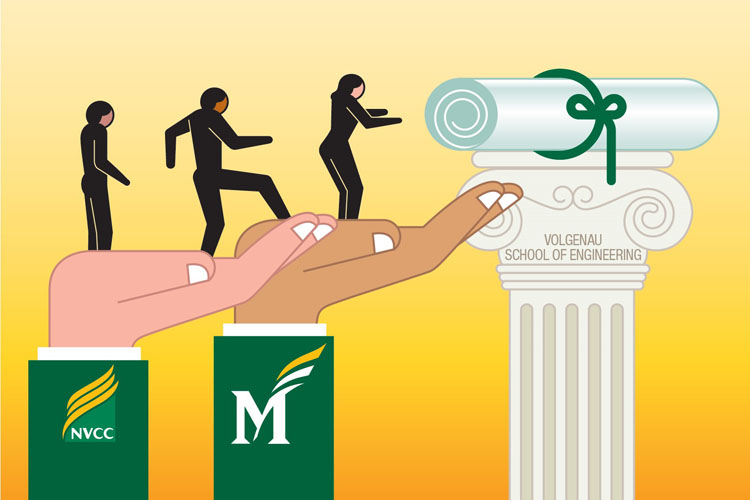
Illustration by Marcia Staimer
Imagine you are a student at Northern Virginia Community College, but one with a valid George Mason University ID card, access to George Mason’s library and its facilities, the ability to join Mason student organizations and the chance to take one Mason course each school year.
If you are a mechanical engineering student in the Mason-NOVA Dual Admissions Compact, those are precisely the privileges available to you.
“We’re allowing NOVA students to dual-enroll as Mason students, right from the very beginning,” said Ken Ball, dean of Mason’s Volgenau School of Engineering. “Our vision is that if you are a dual-enroll NOVA student from year one, then your transition to Mason after completing your associate’s degree will be seamless and you should be able to finish your bachelor’s degree in just two more years.”
The compact includes seamless and fully advised admission into Mason as a junior with full credit for NOVA’s mechanical engineering classes, which have the same expected student outcomes as those courses offered at Mason. Additionally, student advising will be a shared responsibility of both NOVA and Mason faculty members.
Primarily, Ball said, the program broadens access and retention, especially in a field such as mechanical engineering, which he said has been relatively immune to STEM outreach aimed at underrepresented groups. It also caters to first-generation college students and students who juggle jobs and family obligations. And, no small thing, it is a way to achieve a Mason degree while paying community college tuition during one’s first two academic years.
“It really provides a pathway to affordability for higher education,” Ball said.
The program is part of a much larger initiative in the works between Mason and NOVA that will further define the framework for students to earn four-year degrees with coursework at both institutions. The programs will be designed for career-driven, cost-minded students, and the co-curriculums will be reinvented to align with student interests and real-world applications.
Thanks to the cooperation between the faculties at both institutions, the mechanical engineering program is the first to be fully implemented.
“We’ve talked about common core themes and common course learning objectives,” said Oscar Barton Jr., chair of Volgenau’s Department of Mechanical Engineering. “If you were to look at the core outcomes of a NOVA statics class, it’s exactly the same course outcomes listed for my statics class at Mason.”
Abe Eftekhari, NOVA’s dean of mathematics, science and engineering, said the program is crucial for his students, and he has spoken with Ball about creating other pathway arrangements with Volgenau programs, including cybersecurity.
“This is an articulation agreement on steroids,” Ball said. “We’re really amping this one up.”
